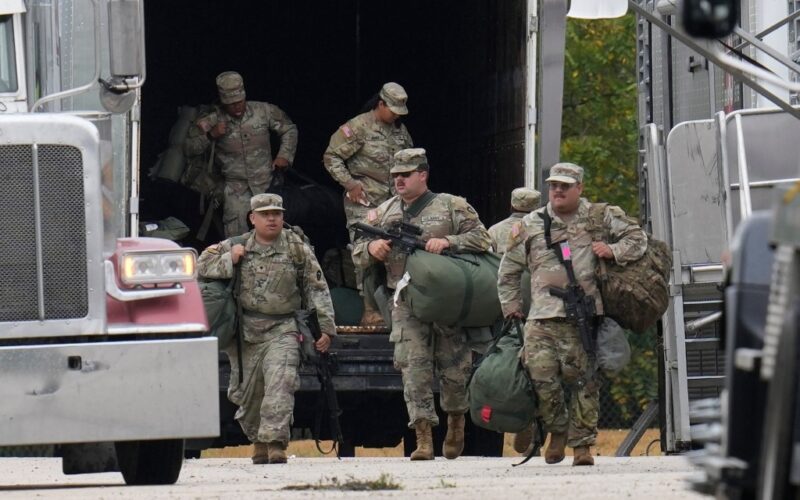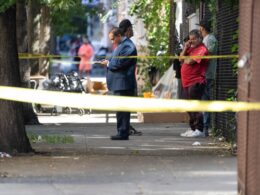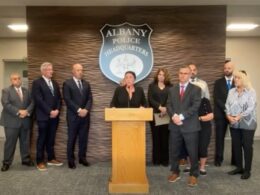The image tells a frightening story.
A masked, federal agent in combat uniform leans out the passenger window of a Jeep and points a military rifle directly at the face of a U.S. citizen in Chicago, simply for recording him.
It should send a chill down every American’s spine. President Trump’s revenge on America’s liberal cities is an authoritarian abuse of power. Americans in 2025 should not have to live in police states or with the National Guard patrolling their streets or pointing weapons at them.
We are not at war, despite what he says about crime and illegal immigration, and we certainly aren’t at war with each other. Although that may be exactly what Trump wants.
And it’s happening. On Tuesday afternoon, the Texas National Guard arrived in Chicago, where federal law enforcement has already clashed with local government officials, local law enforcement, U.S. citizens, and journalists.
Illinois Gov. JB Pritzker has accused the Trump administration of militarizing Customs and Border Protection (CBP) and ICE agents to “cause violence and chaos” and incite city residents.
Broadview Police Chief Thomas Mills, in a lawsuit filed by Pritzker, also says in sworn testimony that “the way in which federal agents have indiscriminately used chemical agents…is unlike anything I have seen before.”
Local officials have been arrested for protesting, and several journalists, including from the Chicago Sun-Times and CBS Chicago News, have been detained, tear-gassed, and pelted with rubber bullets.
Last week, CPB agents shot an unarmed woman. In September ICE agents shot and killed an unarmed illegal immigrant in Franklin Park. Also last month, 300 federal agents raided an apartment building — some rappelling from Blackhawk helicopters — zip-tying citizens and even children and eventually arresting 37 people they say are here illegally or tied to gangs or drug cartels.
This is setting up a potentially explosive situation, and one that Trump is promising to replicate in other cities like Portland and Los Angeles, wherein he sends in troops, incites protests and violence, and then invokes the Insurrection Act to go to war with Americans, round up dissenters, and even call off elections.
In addition to this being demonstrably bad for America, you’d think this would also be bad for Trump, politically.
But not so fast.
The politics of Trump’s months-long war on cities, and whether it will hurt him or Republicans in the coming midterm elections, is unclear and complicated.
The murkiness is evidenced in a tale of two polls.
On the one hand, Americans oppose militarizing law enforcement in U.S. cities without an explicit external threat, by 58%, according to a new Reuters/Ipsos poll.
On the other, Trump’s approval, specifically among voters in U.S. cities, is above water despite his interventions. A brand new TIPP Insights poll of 1,459 adults conducted between Sept. 30 and Oct. 2 showed his approval at 47%, versus 44% disapproval.
Additional polls flesh out the seeming contradiction.
A majority of Americans believe crime is up in the last year and the level of crime and violence in American cities is unacceptably high, according to NPR/Ipsos polling from this month.
But a majority also opposes using the federal government to take control of local law enforcement.
On immigration, 57% disapproves of Trump’s handling of deportation, but 56% approves of peaceful arrests of illegal immigrants.
To sum this up, Americans seem to agree with Trump on the problems, but not on his solutions.
So how does that shake out?
The tendency, particularly for the left, is to want to believe opposition to Trump’s tactics will translate to opposition to Trump and Republicans. What they often don’t take into account is the fact that plenty of voters will still give him credit for simply trying, or correctly identifying a problem. This is especially true when Democrats insist problems like crime or illegal immigration aren’t real, or as bad as voters feel they are.
Democratic officials are reacting to Trump’s war on cities in various ways. Some states are suing to block him. But Washington, D.C., Mayor Muriel Bowser capitulated and signed an executive order formalizing cooperation between the city and federal forces.
New York’s mayoral frontrunner, Democratic socialist Zohran Mamdani is vowing to fight Trump’s threats to take over NYC if he wins his election.
The question is, will voters in these states see people like Pritzker and California Gov. Gavin Newsom as standing up to Trump? Or standing in Trump’s way of solving problems?
Both sides are taking some pretty big political risks here. Will Trump get the blame if cities like Chicago become powder kegs? Or will he get the credit simply for showing up? It’s not that simple.








